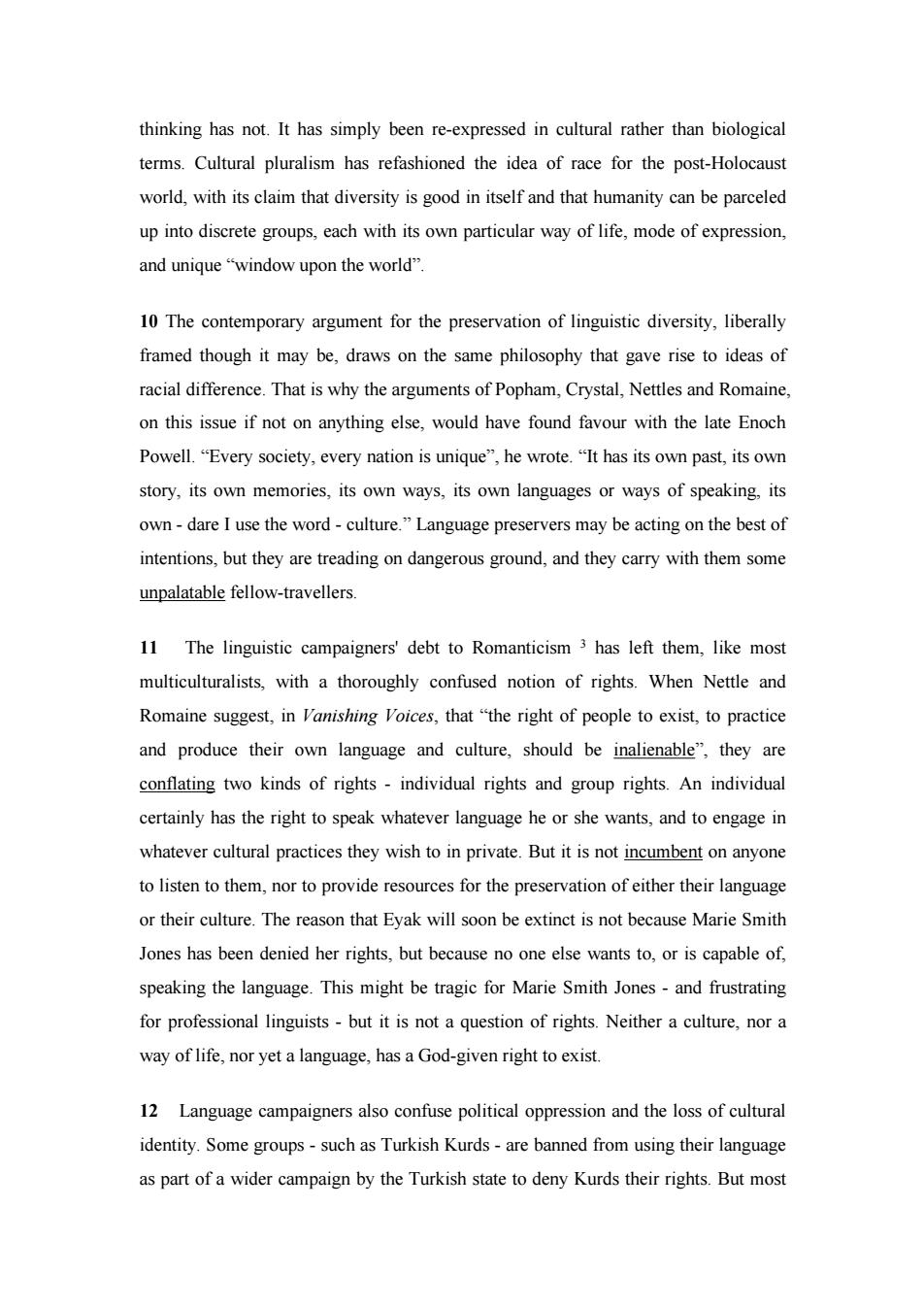正在加载图片...

thinking has not.It has simply been re-expressed in cultural rather than biological terms.Cultural pluralism has refashioned the idea of race for the post-Holocaust world,with its claim that diversity is good in itself and that humanity can be parceled up into discrete groups,each with its own particular way of life,mode of expression, and unique"window upon the world". 10 The contemporary argument for the preservation of linguistic diversity,liberally framed though it may be,draws on the same philosophy that gave rise to ideas of racial difference.That is why the arguments of Popham,Crystal,Nettles and Romaine, on this issue if not on anything else,would have found favour with the late Enoch Powell."Every society,every nation is unique",he wrote."It has its own past,its own story,its own memories,its own ways,its own languages or ways of speaking,its own-dare I use the word-culture."Language preservers may be acting on the best of intentions,but they are treading on dangerous ground,and they carry with them some unpalatable fellow-travellers. 11 The linguistic campaigners'debt to Romanticism 3 has left them,like most multiculturalists,with a thoroughly confused notion of rights.When Nettle and Romaine suggest,in Vanishing Voices,that "the right of people to exist,to practice and produce their own language and culture,should be inalienable",they are conflating two kinds of rights-individual rights and group rights.An individual certainly has the right to speak whatever language he or she wants,and to engage in whatever cultural practices they wish to in private.But it is not incumbent on anyone to listen to them,nor to provide resources for the preservation of either their language or their culture.The reason that Eyak will soon be extinct is not because Marie Smith Jones has been denied her rights,but because no one else wants to,or is capable of, speaking the language.This might be tragic for Marie Smith Jones-and frustrating for professional linguists-but it is not a question of rights.Neither a culture,nor a way of life,nor yet a language,has a God-given right to exist. 12 Language campaigners also confuse political oppression and the loss of cultural identity.Some groups-such as Turkish Kurds-are banned from using their language as part of a wider campaign by the Turkish state to deny Kurds their rights.But mostthinking has not. It has simply been re-expressed in cultural rather than biological terms. Cultural pluralism has refashioned the idea of race for the post-Holocaust world, with its claim that diversity is good in itself and that humanity can be parceled up into discrete groups, each with its own particular way of life, mode of expression, and unique “window upon the world”. 10 The contemporary argument for the preservation of linguistic diversity, liberally framed though it may be, draws on the same philosophy that gave rise to ideas of racial difference. That is why the arguments of Popham, Crystal, Nettles and Romaine, on this issue if not on anything else, would have found favour with the late Enoch Powell. “Every society, every nation is unique”, he wrote. “It has its own past, its own story, its own memories, its own ways, its own languages or ways of speaking, its own - dare I use the word - culture.” Language preservers may be acting on the best of intentions, but they are treading on dangerous ground, and they carry with them some unpalatable fellow-travellers. 11 The linguistic campaigners' debt to Romanticism 3 has left them, like most multiculturalists, with a thoroughly confused notion of rights. When Nettle and Romaine suggest, in Vanishing Voices, that “the right of people to exist, to practice and produce their own language and culture, should be inalienable”, they are conflating two kinds of rights - individual rights and group rights. An individual certainly has the right to speak whatever language he or she wants, and to engage in whatever cultural practices they wish to in private. But it is not incumbent on anyone to listen to them, nor to provide resources for the preservation of either their language or their culture. The reason that Eyak will soon be extinct is not because Marie Smith Jones has been denied her rights, but because no one else wants to, or is capable of, speaking the language. This might be tragic for Marie Smith Jones - and frustrating for professional linguists - but it is not a question of rights. Neither a culture, nor a way of life, nor yet a language, has a God-given right to exist. 12 Language campaigners also confuse political oppression and the loss of cultural identity. Some groups - such as Turkish Kurds - are banned from using their language as part of a wider campaign by the Turkish state to deny Kurds their rights. But most